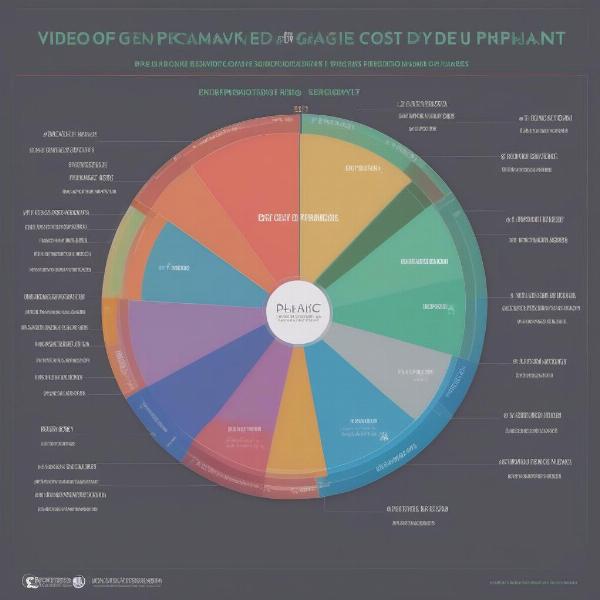Developing a video game can cost anywhere from a few thousand dollars to hundreds of millions, depending on a wide array of factors. Understanding these factors is key to budgeting effectively and making informed decisions throughout the development process. So, how much does making a video game really cost? Let’s dive in.
Factors Influencing Video Game Development Costs
Numerous factors contribute to the final price tag of a video game. These can be broadly categorized into scope, team size, platform, genre, and marketing.
Scope and Complexity
The scope of your game, including its features, gameplay mechanics, story length, and world size, significantly impacts the cost. A simple mobile game with basic 2D graphics will naturally cost less than a sprawling AAA open-world RPG with cutting-edge visuals and complex AI. Think of it like building a house: a small cabin requires fewer resources than a multi-story mansion.
Team Size and Expertise
The size and experience of your development team play a crucial role. A larger team with specialized roles (programmers, artists, designers, writers, composers, etc.) will incur higher salaries and overhead costs. Experienced developers typically command higher rates, but their expertise can also lead to increased efficiency and a higher quality product.
Platform and Target Audience
Developing for different platforms (PC, consoles, mobile) involves varying costs. Console development often requires licensing fees and specialized hardware, while mobile development can be more accessible but necessitates optimizing for a wide range of devices. Your target audience also influences the cost. Games aimed at a niche market might require less extensive marketing compared to mainstream titles.
Genre and Art Style
The chosen genre and art style significantly impact the budget. A realistic 3D game with detailed character models and environments will require more artistic resources and technical expertise than a stylized 2D game. Similarly, genres like RPGs and MMOs, which often involve extensive content creation, tend to be more expensive to develop than puzzle or arcade games.
Breaking Down the Costs: A Detailed Look
To understand the cost breakdown, let’s examine the key areas where your budget will be allocated.
Pre-Production
This phase involves conceptualization, design documentation, prototyping, and planning. Costs include market research, concept art, and initial prototypes. This stage is crucial for establishing a solid foundation and can represent 10-20% of the total budget.
Production
This is the main development phase, encompassing programming, art creation, level design, sound design, and testing. This stage typically consumes the largest portion of the budget, often ranging from 50-70%.
Post-Production
This phase includes bug fixing, polishing, localization, and porting to different platforms. Costs also include quality assurance testing and preparing the game for release. This stage can account for 10-20% of the total budget.
Marketing and Distribution
Marketing and distribution are crucial for reaching your target audience. Costs include advertising, public relations, community engagement, and platform fees. The marketing budget can vary significantly, depending on the game’s scope and target market.
 Breakdown of Video Game Development Costs
Breakdown of Video Game Development Costs
Different Budget Tiers: From Indie to AAA
Game development budgets can be broadly categorized into different tiers.
-
Indie Games: These often have smaller budgets, ranging from a few thousand to a few hundred thousand dollars. Indie developers often prioritize creativity and innovation, utilizing smaller teams and focusing on specific niche markets.
-
Mid-Tier Games: These games typically have budgets in the millions of dollars and involve larger teams with more specialized roles. They often aim for a wider audience and may incorporate more complex features and higher quality graphics.
-
AAA Games: These represent the highest budget tier, often exceeding hundreds of millions of dollars. AAA games typically involve large teams, cutting-edge technology, extensive marketing campaigns, and aim for a global market.
“Budgeting realistically is paramount. Understanding your resources and limitations is key to a successful development process,” says Sarah Chen, Lead Producer at Galactic Games Studio.
How to Manage and Optimize Your Game Development Budget
Effective budget management is crucial for any game development project. Here are some tips to help you stay on track:
-
Detailed Planning: Create a comprehensive budget plan that outlines all anticipated costs, including salaries, software licenses, marketing, and contingency funds.
-
Prioritize Features: Focus on core gameplay mechanics and essential features first. Avoid adding unnecessary features that can inflate the budget without significantly enhancing the player experience.
-
Efficient Workflow: Implement an efficient development pipeline and utilize project management tools to track progress and manage resources effectively.
-
Regularly Review and Adjust: Continuously monitor your budget throughout the development process and make adjustments as needed. Be prepared to adapt your plans based on unforeseen challenges or changes in scope.
-
Consider Funding Options: Explore different funding options such as crowdfunding, grants, or investors to secure additional resources.
“Flexibility and adaptability are key to successful budget management. The game development landscape is constantly evolving, so be prepared to adjust your strategy accordingly,” adds David Lee, Senior Financial Advisor at Interactive Entertainment Consulting.
Conclusion
The cost of making a video game can vary dramatically depending on numerous factors. Understanding these factors and implementing effective budget management strategies is essential for a successful development process. While developing a AAA title might seem appealing, starting with a smaller, more manageable project can provide valuable experience and build a foundation for future endeavors. How Much Does Making A Video Game Cost? Ultimately, it depends on your vision, resources, and strategic planning. So, start planning, start creating, and embark on your game development journey!
FAQ
-
What is the cheapest way to make a video game?
Developing a simple mobile game with limited features and basic graphics is typically the most cost-effective approach. -
How much does it cost to make a AAA game?
AAA game development can cost hundreds of millions of dollars due to large teams, high-fidelity graphics, extensive marketing, and complex features. -
Can I make a video game for free?
While it’s possible to utilize free game engines and assets, creating a polished and commercially viable game typically requires some financial investment. -
How long does it take to make a video game?
Development time varies depending on scope and complexity, ranging from a few months for smaller indie games to several years for AAA titles. -
What are the main expenses in game development?
Salaries, software licenses, marketing, and hardware/equipment are some of the major expenses in game development. -
How can I find funding for my game development project?
Crowdfunding platforms, grants, investors, and personal savings are potential funding sources for game development. -
Do I need a large team to make a video game?
Small teams or even solo developers can create successful games, especially within the indie space.

